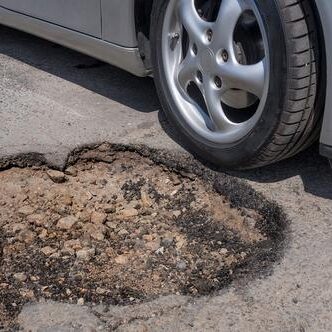Does your business’s asphalt driveway have damage? Potholes are a common type of paving problem that can affect your property. If this is your first experience with paving, take a look at the top pothole questions answered.
What Are Potholes?
Before you can attempt to repair a pothole, you need to make sure your business’s driveway has this common type of asphalt damage. Potholes are depressions in the ground caused by a failure in the paving material, and these holes are more commonly seen in the early spring.
Unlike sink holes (another type of ground-level depression), potholes aren’t naturally caused depressions. Sink holes often form suddenly, after the material underneath the top soil subsides. In comparison, potholes may happen over weeks, months, or seasons.
While an asphalt driveway may have cracks, pits, or other types of damage, a pothole looks different from these issues. Instead of a jagged line or slim dip, you’ll see missing chunks of pavement. If you’re still not sure whether the driveway has a pothole, an asphalt contractor can accurately assess the area and determine whether this type of pavement damage is the problem.
How Do Potholes Form?
An asphalt driveway typically has a lifespan of 15 to 20 years. Even though asphalt is a durable, long-lasting material, it can dry and become brittle over time. This can lead to cracks — especially with repeated wear.
As water makes its way into the cracks, the underlying rock, clay, or gravel (roadbed) absorbs the moisture. Without the support of the roadbed, the asphalt can sink and crack as cars and other vehicles repeatedly drive over the area. The result is a pothole depression in the driveway.
Why Do Potholes Form in the Spring?
Even though potholes can develop any time of the year, this type of damage is more likely to happen in the spring. The freeze-thaw cycle of the late winter and early spring can cause excessive moisture on the roads — and your driveway. Melted snow and rainwater makes its way into cracks in your driveway. When the mercury dips, the water expands. This widens the existing cracks and damages the roadbed.
The more the area freezes and thaws, the more damage the late-winter and early-spring elements can do. Combine this damage with heavy springtime rains and you may see increased pothole formation activity.
What Should You Do About Potholes?
Do you have a pothole in the asphalt driveway of your business? While you could leave the potholes as-is, failure to fix the problem can result in additional damage. Not only can the asphalt damage spread and create larger potholes, but these deep dips can also damage your customers’ cars.
If you shouldn’t leave a pothole untreated, how can you repair the area? While it’s tempting to fill in the hole yourself, a DIY approach isn’t always the best option. Pothole repair may seem easy. But this type of exterior improvement project requires professional attention.
To successfully fill a pothole, the contractor needs to clean and prepare the area. Failure to properly prep the pothole may result in a repeat situation next spring. The asphalt won’t adhere properly to the edges and may crack or crumble under the weight of vehicles.
How Will Your Contractor Repair the Pothole?
The contractor will prepare the area and clean any remaining debris, such as gravel or plants. However, the specific fix depends on the extent of the damage.
The contractor may also fill, patch, and seal the driveway. This may include a full-depth approach, where the contractor removes the entire surface of the area before patching the hole. But if the damage is severe, multiple potholes are present, or the contractor feels a patch will only temporarily fix the problem, they may need to repave the entire driveway.
Do you need to hire a professional to repair the driveway to your business? Contact Arrow Black Top & Masonry, Inc., for more information.

